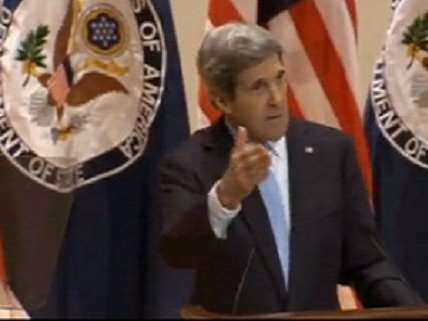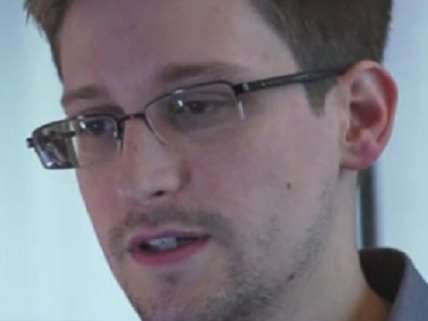Seven Pieces of Good News for Freedom in 2013
Highlights from an eventful year.

Nick Gillespie and Matt Welch's The Declaration of Independents, published in 2011, provides a hopeful outlook for the future of freedom, a vision of how libertarian politics can fix America's problems. How did 2013 pan out for the libertarian moment upon us? Here are seven pieces of good news for freedom this year from some of us here at Reason. —Ed Krayewski
1. No Tolerance for Zero Tolerance

As 2013 began, America was still reeling from a mass murder at a Connecticut elementary school. Parents and officials across the country were nervous that something similar might happen in their backyards, and that nervousness translated into a series of strange school security scares, many of them involving absurd zero-tolerance decrees. The most infamous might be the second-grader in Maryland who was suspended for chewing a Pop-Tart into the shape of a gun.
It was easy to assume that the reign of zero tolerance was just going to get worse, as school districts felt the same bureaucratic imperatives that swept the nation after the Columbine massacre of 1999. It didn't help that both liberals and conservatives were calling for measures that had fed the zero-tolerance beast in the past. But then something unexpected happened. Those silly security scares were mocked in the press. Politicians proposed bills to roll back zero tolerance's excesses, and schools across the country adopted new policies that might not be a civil libertarian's dream but at least give officials more flexibility in doling out punishments and make it less likely that a misbehaving student will be pushed into the criminal justice system. As victories go, these may be small, but a year ago I didn't expect this to be an area where there would be victories to celebrate at all. —Jesse Walker
2. The Sharing Economy Unshackled

In November, the City Commission of Grand Rapids, Michigan unanimously voted down a proposed law that would've made it a crime for residents to advertise on Airbnb, the popular home-sharing platform that provides travelers with an alternative to hotels. California initially sought to quash ride-sharing platforms like Lyft and SideCar that compete with taxi cartels. Then it changed course and in September adopted new regulations allowing these businesses to operate legally in the Golden State.
In 2013, the emerging "sharing economy," in which online platforms allow individuals to trade goods and services amongst themselves, drew opposition from restaurant, taxi, and hotel associations seeking to use their political influence to block competition. But these peer-to-peer businesses scored big wins in several states and municipalities, and it wasn't just libertarians leading the fight for economic freedom. Peers, a new advocacy organization for the sharing economy, is run by Natalie Foster, a veteran of the Obama campaign and MoveOn.org. Foster and her colleagues are applying their experience in grassroots activism to prevent entrenched interests from strangling this nascent sector. —Jim Epstein
3. 3D Printing Guns a Reality

While 3D printing isn't, yet, quite as futuristic as a Star Trek replicator, it brings manufacturing to the desktop and promises to revolutionize and decentralize industry. 3D printing also makes banning physical objects—most famously firearms—an impossible task, since it turns anybody with a printer into a potential manufacturer of almost anything. Just months after the open-source group, Defense Distributed, demonstrated the practicality of a working gun 3D-printed in plastic, U.S.-based Solid Concepts, announced it would sell 3D-printed semiautomatic pistols. —J.D. Tuccille
4. The True Beginning of the End of the Ban on Gay Marriage

A handful of states had already decided to recognize same-sex marriages well before the Supreme Court took up the Defense of Marriage Act in United States v. Windsor earlier this year. The court ruled that the federal government must recognize gay marriages from states that also allow them. The ruling opened up a host of federal privileges and benefits to those who had been denied them entirely because of their sexual orientation, not because of any rational policy. Eight states legalized gay marriage recognition in 2013 (nine if you count California re-legalizing it), more than any year since Massachusetts led the way in 2003. —Scott Shackford
5. White House Not Targeting Marijuana Legalization in Washington, Colorado, Starts to Consider Drug Sentencing Reform
This summer, ten months after voters in Colorado and Washington approved measures legalizing marijuana in their states, the federal government finally weighed in, giving the states a kind of yellow light in a Department of Justice memo that promised prosecutors would exercise restraint if there were "a tightly regulated market" in the states. A few weeks earlier, Attorney General Eric Holder signaled that the Obama Administration was interested in reforming mandatory minimum drug sentencing. Earlier this month, the president commuted the sentence of eight people who had spent more than fifteen years in prison each on various discharges. These measures may all seem like too little, too late, but reveal a changing political reality, one where Republicans like Rand Paul and Democrats like Cory Booker can work together to roll back criminal justice policies that only serve to restrict freedom. —Ed Krayewski
Next: The war that wasn't, the spying that was
6. U.S. Avoids War in Syria

It is hard to find any good news that has come out of Syria in the last year. The brutal conflict continues and has resulted in not only the mindless slaughter of thousands, but also in the growth of a vast humanitarian crisis.
The most significant of the few pieces of good news relating to the conflict in Syria this year is that the U.S. did not carry out a military intervention in the wake of the chemical attacks on Damascus suburbs in August. Despite calls from policy makers around the world for a military response to the chemical attacks, the U.S. agreed to a diplomatic solution with Russia as a way to deal with Syria's chemical weapons. —Matthew Feeney
7. Edward Snowden's NSA Disclosures

Former NSA contractor Edward Snowden's disclosures about that spy agency's clandestine surveillance operations, including the widespread collection of Americans' phone records and a program called Prism that tapped into the servers of many of America's most prominent Internet companies, rocketed the debate about surveillance and civil liberties to the forefront of American political discourse. It put the Obama administration on the defensive, with the president's statements on what the NSA doing being contradicted by subsequent revelations. Over the summer, an amendment that would defund some of the NSA's domestic surveillance fell just seven votes shy of passing in the House, a remarkably close margin. In an interview with the Washington Post, Edward Snowden said his mission was accomplished, explaining that it had been accomplished the moment "journalists were able to work." Though Snowden remains a targeted fugitive of the US government, his ability to get his disclosures out, and of the American press to be able to report on them in a way their British counterparts can't always do, is certainly good news for freedom, even if the substance of the revelations aren't. —Ed Krayewski
